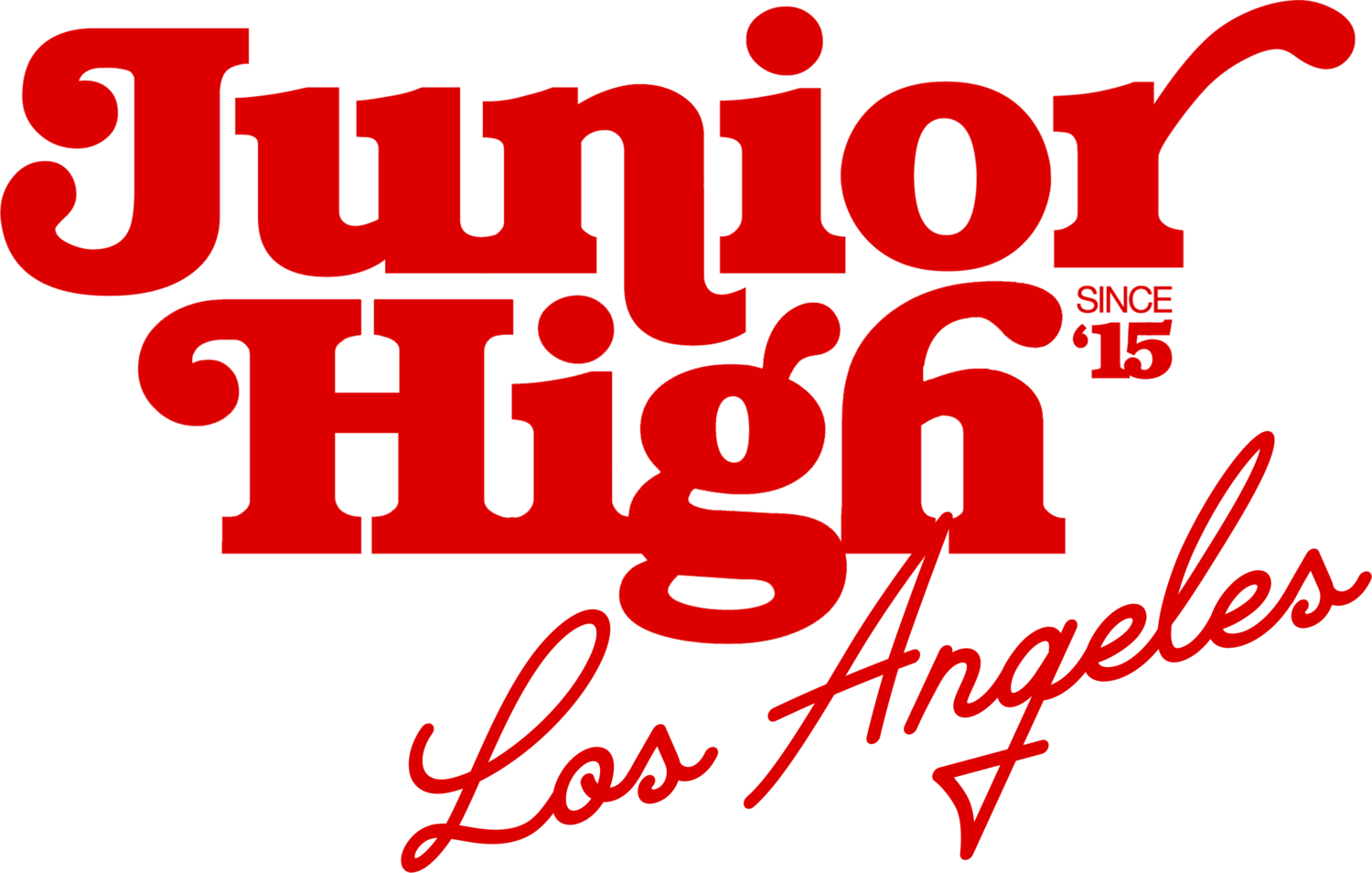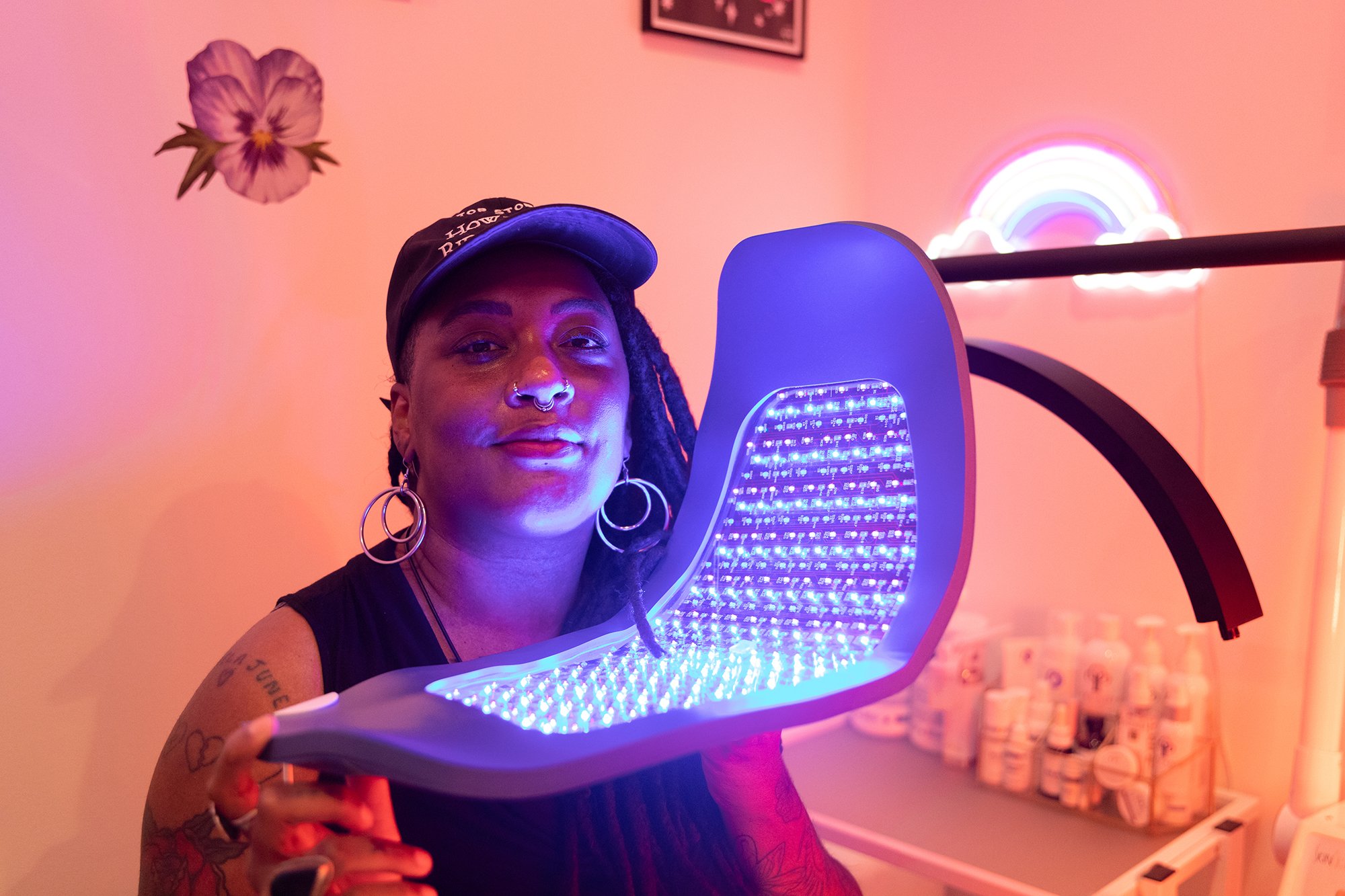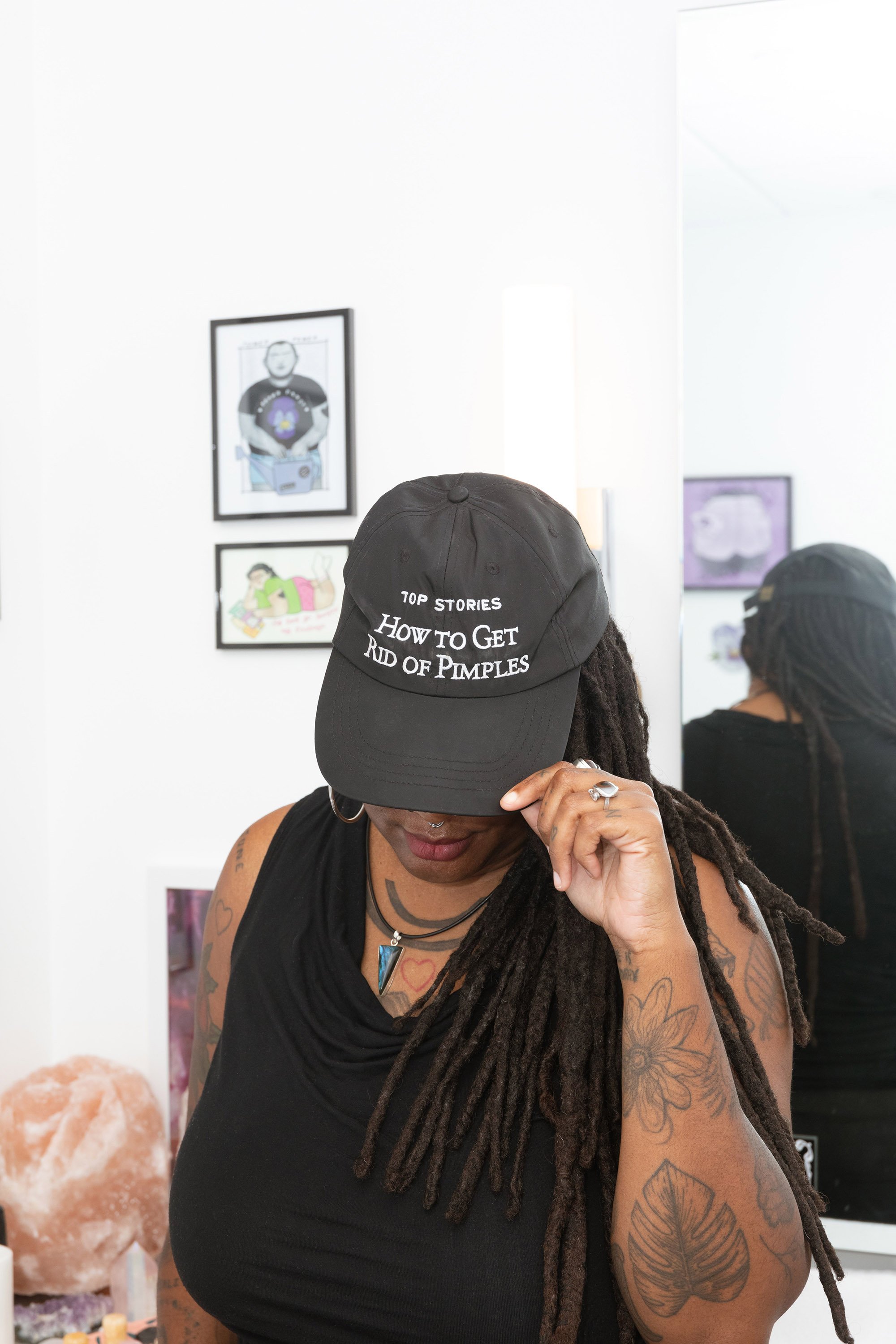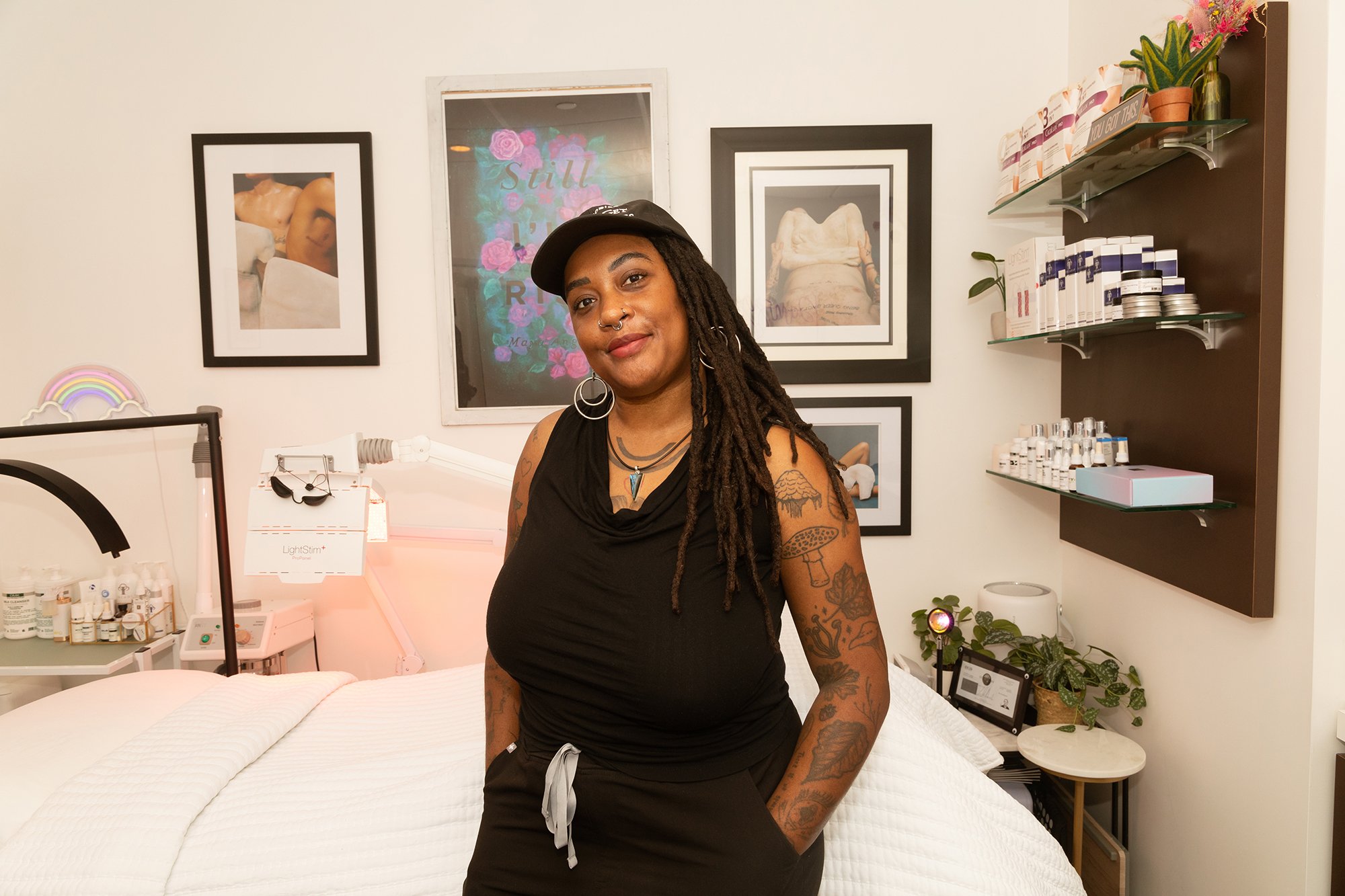Pansy Esthetics is for the People
⤏ ESTHETICIAN LEOLA DAVIS ON CATERING TO QUEER AND BIPOC SKINCARE NEEDS
⤏ IN CONVERSATION WITH SEPTEMBER HARTMAN
⤏ PHOTOGRAPHY BY DANIEL HERMOSILLO
If you weren’t already familiar with Leola Davis’ work as an esthetician, you’d probably think she’s had decades of experience. You’d be wrong. Since becoming a licensed esthetician in March 2021, Leola opened her own studio — Pansy Esthetics — and started specializing in top surgery recovery treatments, scar repair, and skincare for people of color. With long term dreams of opening a queer-centric one-stop spa for gender-affirming and self-care needs, former client September Hartman asks Leola how she got here, and where she wants to go next.
SEPTEMBER HARTMAN: How and when did you get into to skincare?
LEOLA DAVIS: I moved to Los Angeles at the end of 2018 and I was having a bunch of mental and physical health issues. I was like, “I really need to do something positive for myself. I think I'll get a facial. That sounds great.“
At the time skincare to me was just doing a random mask that was laying around. There was this facialist —Celeste Rodriguez — that I got my first facial from. I loved it. This was like the beginning of 2019, like January or February of 2019. I was like, “Whoa, this is amazing. I love it.” I would save up money to go and get a facial every month. That was like the thing that I did for myself.
And as a result, I watched so many of my mental health issues — I don't want to say disappear — but calm down because I was doing something for myself that helped my nervous system and felt calming. I did that for all of 2019 and I became obsessed. I watched my skin transform. I felt passionate about skincare. That was the beginning of 2019, and then by December of 2019 I was starting esthetician school. That whole year was my skincare year, my skincare journey. I graduated in June of 2020 but I wasn't able to get licensed until March of 2021 because of COVID. As soon as I was licensed, I immediately got a job at a med spa, and I worked there until I started Pansy.
SH: In terms of timeline, emotions, and logistics, how did you make the jump from I'm working at a med spa to starting your own business?
LD: I immediately got hired at a med spa and I thought all through school, “That's what I want to do. I want to work in a med spa. I want to be a medical esthetician as opposed to a spa esthetician.” I did that, and I did that for a while, but then I realized this isn't a very safe or welcoming place for queer and trans people, or for black and brown people. A lot of the practitioners don't know how to treat black and brown skin, and a lot of the practitioners were not trans friendly. I did not feel comfortable inviting people there. I quit and that same day went looking for my own studio to rent.
I told my therapist I quit and was like, “I don't even know what I'm gonna do now. Should I just open my own business?” She was like, “Yes, do it. Why not?” I’m such a spontaneous person that I immediately signed a lease and was like, “Okay, I'm doing this.”
SH: There's nothing about your space or the quality of your work that doesn't say, this person has been doing this for 10 plus years. I guess now I'm like, how could she have done all these things if she hasn't been doing this for forever? When you said that you were starting esthetician school in 2019, my brain was like that meme of the white lady with the math in the air. Based on the quality of your service and your level of knowledge that makes absolutely no sense to me, but go off queen.
LD: I have ADD and I always struggled in school. I never felt super passionate about things, and nothing made sense to me. But skincare just clicked. So now I feel like such a huge nerd and I'm like, I love learning. I love taking classes. I love this. It’s really cool to be pushing 40 and to finally be like, “Wow I finally have something that I love and feel excited about.”
SH: What did you notice was absent from the med spa you worked in that you feel like you provide?
LD: [I hope Pansy is] a safer place for queer and trans people to be, for Black and brown people to feel confident that somebody knows how to care for their skin. I don’t want anyone to feel like they’re on the back burner or that they’re a second thought. I want everybody to feel like they’re a priority, and that they feel comfortable walking into the space and feel like they don’t have to hide anything about themselves.
SH: And you do that so well. Why is offering this type of treatment important to you?
LD: It's important because I know there's a lack of this type of care out in the world. It makes such a huge difference. Everyone should have access to these types of services for their body, for their care, especially after major surgeries.
SH: You specialize in top surgery aftercare. Are all of your top surgery treatments the same or how do they differ?
LD: They are not all the same. I base my treatments off of type of surgery and how long ago the surgery was. Treatments typically include a DMK international enzyme, but they vary in other steps. I offer top surgery treatments for any array of reasons — double mastectomy for gender related reasons, [or] for cancer related reasons. I do breast reductions, and breast implants.
SH: She’s got it all! Do you only offer top surgery scar repair?
LD: No, actually I’m branching out into doing all kinds of scar repair. I just had a friend who had facial feminization surgery and I just started treating her. She’s got a scar all the way across her forehead, on her nose and her mouth. I’ve been using the same protocols that I would use for treating someone’s chest just altering that to be the face. I would also love to help folks who have had C-sections, or any kind of scar repair basically.
“I don’t want anyone to feel like they’re on the back burner or that they’re a second thought. I want everybody to feel like they’re a priority, and that they feel comfortable walking into the space and feel like they don’t have to hide anything about themselves.”
SH: Will you offer training to other estheticians?
LD: Yeah, once I’m a little more stable in my business and in my clientele. I think I will then branch out on teaching a masterclass.
SH: What has been the biggest challenge and what’s been the biggest plus in offering these treatments?
LD: The biggest plus I think is definitely seeing the impact that it has on my clients, how happy they are and just how much of a difference it makes. The biggest challenge has been definitely getting the word out to people. That’s been really hard for me. Outside of Instagram it’s like, how do I advertise this? Then Instagram is also not the best at advertising, lately.
SH: If money access, time and other roadblocks weren’t a factor in life, what would you do with your services?
LD: I would go on a fucking tour and go state to state offering treatments. Like a tour van, decked out mobile service offering treatments to people and doing pop-ups. That’s 100% what I would do.
SH: I want to hear about your upbringing. Where did you grow up?
LD: I actually grew up in multiple places. I did kind of a back and forth growing up between San Diego and Indiana. When I was 19, I moved into this giant punk house in Missouri and we hosted shows in our basement. I did all the bookings for that. I’ve always loved music. My friends and I started a Girls Rock Camp in Missouri like they had in Portland. We started one in Columbia from scratch. It was Girl’s Rock for a couple years before we switched to Queer Rock Camp.
SH: Why did you stop pursuing music as a career?
LD: I moved from Missouri to Seattle to work at Queer Rock Camp. At the time I was like, “Maybe I’ll still do some kind of music booking or working for a festival.” When I made it to Seattle, I started working at Babeland which was a queer, woman-owned sex toy store and I became invested in that.
SH: Looking back, you’ve done so many different things but you’ve always been involved and immersed in the queer community. When did that start? Was that something you were always comfortable with? Is there a coming out story in there?
LD: Honestly, I never came out. I was raised by gay and trans people and sex workers. I never had too. It was never a thing.
SH: There was nothing to come out of.
LD: I don’t feel like I have a coming out story. Maybe I came out to myself? Or at least acknowledged the fact that I was gay and wasn’t happy dating straight cis-men. I got into the punk scene when I was 14 years old and my compassion for giving back, solidarity, and showing up for people was really ignited.
As someone who grew up without access to a lot of things, and not being seen as someone who is a priority, I’ve always wanted to make people feel welcome and safe.
SH: Do you feel like that is the thing you’re always searching for in your current line of work? How to provide people that feeling of safety?
LD: I think so. I want everyone to feel loved and welcomed. I’m like, would I want this? Is this going to make me feel good? Yes. Let’s do this for other people. I think subconsciously or not, that’s always what I’m trying to do on a path to heal my inner trauma by helping other people.
“I think subconsciously or not, that’s always what I’m trying to do on a path to heal my inner trauma by helping other people.”
SH: I can personally say you helped me. I came to you for that second top surgery treatment, and my scars looked a lot different than the first time I came. Coming in I felt very vulnerable, but I left feeling so much better because of your service and the nurturing energy that you provided. It was such a safe space. When you leave the doctor’s office for this kind of surgery, they just let you go. They don’t really tell you what to do. It’s like you’re taking a baby home. You don’t know that there are services like the ones you offer. It was so powerful knowing I was making steps towards my healing. I don’t know anybody else that does what you do.
LD: I came up with the treatment because so many people around me were having top surgery or breast reductions. I had given a facial to my friend who had top surgery and they were just like, “It was really intense. I’m so tender. My nipples are having issues.” I was like, “Why don’t I offer a treatment for this? It's skin and I know how to treat skin. I know how to help heal these things.” Surgeons are just like, “Okay, see ya. Hopefully your nipple doesn’t fall off.”
SH: That’s what they told me! [The surgeons] were like, “After the first two weeks you’re clear for your nipples not falling off,” and I was like, “At what point was anyone going to mention that was a risk in this scenario?”
LD: Exactly! It’s definitely needed. I know of a couple estheticians who are trying to offer the same treatment now! That also feels really cool because people message me from all over asking if I know other professionals in their area.
SH: That is so cool that you are so aware of and connected to the other professionals in your field. You'll have like a consortium of professionals, an amazing bustling network of people that are ready to really swoop in when people get gender affirming surgery.
LD: That's definitely what I'm trying to build. My goal is to create some sort of center for people requiring a bunch of different services. You can get facials and body treatments, you can get your nipples touched up or tattooed, you can do massage, acupuncture, [or] both. I would love to create a one stop shop for queer and trans people to come and feel comfortable and safe. That is my goal.
SH: That would be so cool. I'm working now for a family with two trans kids that both want top surgery. It feels feels in some ways like a manifestation of the dream you have helped me build. The kids are 13 and 14, so it's a long way off for them, but I get to be a light for them simply by existing as I am. I talk to them about what my experience has been like, and I talk to them about people like you. It’s like you said, being the support system that you might have needed at the time that you were growing up. It’s the greatest, most fulfilling feeling. In the past I felt like there were specific things I had to do to be that person for people, but for these kids, all I have to do is be there. I just have to show up. That is the greatest gift.
LD: Can you imagine if you had that support when you were younger?






